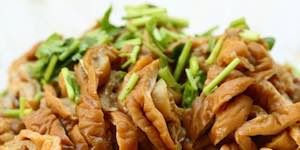But on Old Man Winter’s coldest days, I always wish that, just one more time, I could sit down to a heaping plate of Jaybird’s chitlins
Jaybird’s Chitlins

If reading novels in one’s old age that were read in boyhood indicates regression into second childhood, I’m headed that way.
Before my tenth birthday, I read everything Edgar Rice Burroughs wrote, especially the Tarzan novels. I even memorized the Ape Man’s special language for communicating with jungle beasts, and preferred it to English, which drove my mother batty.
Burroughs didn’t start out as a writer, but after reading pulp magazines, he observed, “I knew I could write stories just as entertaining and probably a whole lot more so than any I read in those magazines,” and he did, writing seventy novels in all.
Sixty years later, I am rereading those novels, and enjoying them as much as the first time. The adventurous story lines, inimitable descriptive powers, and numerous sub-plots keep me turning pages long into the night.
This great American writer’s craftsmanship was impeccable: He was a quintessential wordsmith; his command of grammar, vocabulary and syntax was limitless, and his insight into human nature was profound.
One such insight explains why I enjoy chitterlings (called “chitlins” in the Mississippi Delta, where they are haute cuisine).
In his novel, The Beasts Of Tarzan, Burroughs states, “Tarzan could eat raw meat, and enjoy small rodents and grubs, which seems to us who have been always ‘civilized’ a revolting fact; but had we learned in childhood to eat these things, they would seem no more sickening to us now than do many of our greatest dainties, at which a savage African cannibal would turn up his nose.”
While growing up on my father’s cotton farm, my boyhood best friend and mentor, Jaybird, taught me to enjoy what he called “soul food,” especially chitlins.
The old black man killed hogs in the dead of winter, when all meteorological factors were most propitious, especially the temperature — the colder, the better.
When all the preparation and cooking were done, his herd of porkers had been converted to hams, chops, hocks, ribs, souse, pickled feet and ears, cracklings, and, of course, my favorite: chitlins.
Before dropping the entrails into a huge black iron cauldron set to boiling with firewood, Jaybird cut and split the intestinal delicacies into foot-long sections, scraped off the fat, and purged them in hot water. His chitlins were the best I have ever eaten.
As a boy, I ate whatever Jaybird ate. When fishing, we enjoyed sardines, crackers, and onions, still my favorite day-on-the-lake snack. His barbecued goat, deer sausage, and fried chicken attracted eaters from all over, including one little white kid — me.
But chitlins were his chef-d’oeuvre, served fried and boiled, with a fresh green salad, hot peppers, and cold buttermilk. What a feast!
Nowadays, folks who have been always civilized turn up their noses at such a feast, especially my daughters, who consider it one of their dad’s most disgusting, uncivilized indulgences.
But on Old Man Winter’s coldest days, I always wish that, just one more time, I could sit down to a heaping plate of Jaybird’s chitlins.
Jimmy Reed -- Bio and
Archives |
Comments
Jimmy Reed is an Oxford, Mississippi resident, Ole Miss and Delta State University alumnus, Vietnam Era Army Veteran, former Mississippi Delta cotton farmer and ginner, author, and retired college teacher.
 If reading novels in one’s old age that were read in boyhood indicates regression into second childhood, I’m headed that way.
Before my tenth birthday, I read everything Edgar Rice Burroughs wrote, especially the Tarzan novels. I even memorized the Ape Man’s special language for communicating with jungle beasts, and preferred it to English, which drove my mother batty.
If reading novels in one’s old age that were read in boyhood indicates regression into second childhood, I’m headed that way.
Before my tenth birthday, I read everything Edgar Rice Burroughs wrote, especially the Tarzan novels. I even memorized the Ape Man’s special language for communicating with jungle beasts, and preferred it to English, which drove my mother batty.